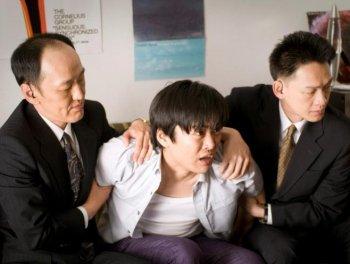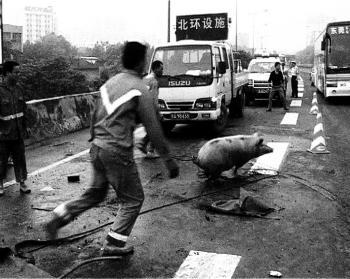TORONTO—While checking out movie pamphlets in the Toronto International Film Festival press office after hours at the Hyatt Regency hotel on King St., I came across one that stood out from the dozens placed there.
A young boy’s timid and innocent eyes looked through an intriguing 10-inch vinyl record holder (does anyone remember these?) which served as the cover for the film’s background information. It just so happened that the second public screening of The Fourth Portrait was showing a few hours later down the road at the brand new TIFF Bell Lightbox Theatre, prominently placed in Toronto’s downtown theatre district.
Although not terribly well attended, a TIFF representative was on hand to let us know that there could be night-vision cameras monitoring the audience for recording devices.
The Fourth Portrait is a powerful film that looks into the life of a 10-year-old boy as he suffers numerous miseries in modern-day Taiwan. An exceptional and distinguished cast and excellent cinematography make up this film by successful Taiwanese Director Mong-Hong Chung.
The gritty and very real look at the boy’s life and family tells a sad and pitiable tale about the pains of childhood. Many will find it difficult to watch. The graphic content serves as a purposeful reminder of the despair and depravity that is in both the society that surrounds the protagonist and in his rather destitute life. “Portrait” looks at the theme of loss and pain, as well as loss of dignity.
It is so real that the film does seem a bit slow at times. Since it is about life, it sometimes mimics its pace, in real time, as we watch cold and emotionless dinner table conversations—or the lack thereof.
The director’s statement attributes the inspiration for the film to the untold stories of the hundred or so children who go missing in Taiwan each year. This is really just a metaphor to illustrate what is missing in society—things such as love, warmth, and dignity.
The theme of absence is explored as the protagonist’s father dies tragically, after which his estranged mother develops a very cold and detached relationship with him and he loses his only friend. It concludes with an outstanding finish as we see the boys’ final “portrait” in the film.
The finale is worth seeing, even if the film lags at times. Especially alluring is the candid and artistic look at the Taiwanese countryside and cityscape.
The story is almost biographical as it peeks into the transitional period of the boy’s life, when he becomes more certain of himself and turns into a young man. Although crude and inappropriate at times, “Portrait” is well done over all. It is full of life’s harsh realities and contains exceptional performances from Taiwan’s most talented and established actors.
Not for the faint of heart, the film is well suited for those interested in learning about the life of a modern Chinese family. The Fourth Portrait is a striking film, but its somewhat bitter theme makes it little hard to swallow.
TIFF Movie Paints Grim Portrait of Life for a Taiwanese Boy
“The Fourth Portrait” looks into the life of a 10-year-old boy as he suffers numerous miseries in modern-day Taiwan.
|Updated:


